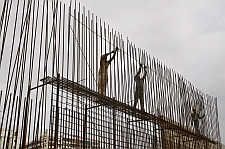 The recent steps by the Reserve Bank of India at tightening liquidity could hit the realty sector, already battling sluggish sales, turning loans to the sector into non-performing assets for banks, say developers and experts.
The recent steps by the Reserve Bank of India at tightening liquidity could hit the realty sector, already battling sluggish sales, turning loans to the sector into non-performing assets for banks, say developers and experts.
RBI on Tuesday said banks could borrow up to 0.5 per cent of their net deposits under the liquidity adjustment window against one per cent earlier and lenders needed to hold cash equivalent of 99 per cent of the cash reserve ratio with them against 70 per cent earlier. Both measures meant banks can lend less money.
“It (liquidity) has been a tough challenge since 2008 and will remain a big challenge. Every real estate company has to do its best to overcome it,” said Rajeev Talwar, executive director, DLF, the country’s largest developer.
“We have steady income from lease and done a large number of launches. Our strategy has been focusing on development and control costs and generate construction finance from our buyers,” he added.
Straddled with huge debt, DLF has sold land parcels and its hotel business, and is looking to sell its wind power business. Mumbai-based developers where sales have been hit hard due to high prices echoed the same views.
“We have to survive despite the policy handicaps. We have to somehow manage the business and debt obligations. People will take measures to stay afloat,” said a chief financial officer of a Mumbai-based company which does business in Western suburbs of the city.
According to him, borrowing costs have gone up 200 to 300 basis points for developers in the last couple years on the top of sluggish home sales. Lalit Kumar Jain, president of the Confederation of Real Estate Developers Association of India, added: “We have to live with it despite the policy being anti-growth and employment.”
Some realty experts such as Sunil Rohokale, chief executive and managing director, ASK Investment Holdings, said realty loans could even become NPAs for banks. “After the RBI move, cost of money could go up and sales velocity would come down. With lower cashflows, developers could face problems with debt repayment and banks could face threat of NPAs,” said Rohokale.
“There is no alternative mode of finance for developers now. If NBFCs (non-banking finance companies) themselves do not get money, how will developers get it.”
Pradeep Jain, chairman of Parsvnath Developers, said if borrowing costs go up, it could lead to increase in property prices.







 © 2025
© 2025